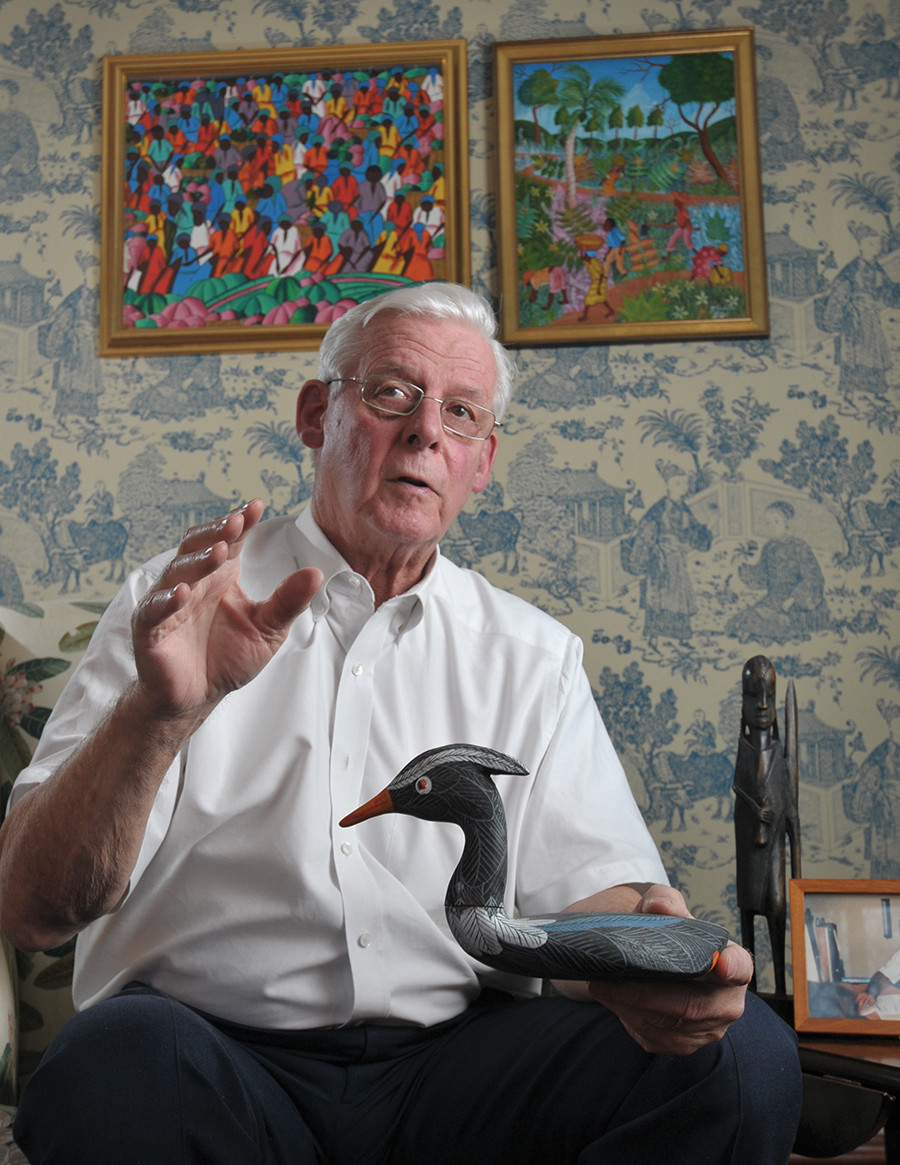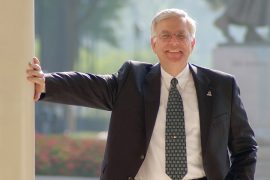Years before the rest of the world grasped the suffering and poverty in Haiti, Dr. Tom Scott was serving its citizens by providing medical care to thousands in need.
By Katherine Reasons-Pyles
HQ 69 | WINTER/SPRING 2010
On Jan. 12, 2010, at 4:53 p.m., a catastrophic earthquake struck the small Caribbean nation of Haiti. The quake killed 200,000 people and left more than 1 million homeless. Its survivors were and still are in desperate need of food, shelter, water and medical care. But while the earthquake itself was only felt on the small island shared by Haiti and the Dominican Republic, its impact was felt around the world.
Almost immediately, calls to action began to come in from all corners – celebrities, the media and the government. And despite a troubled economy, Americans managed to pull together hundreds of millions of dollars to assist and fund aid organizations.
But long before we witnessed the pain of our Haitian brothers and sisters, long before our newscasts and lives were filled with the island’s stories of tragedy and hope, an orthopedic surgeon in Huntington was on a mission, contributing his time, money and compassion to the people of Haiti.
Tom Scott, M.D., a Huntington native and consultant at Scott Orthopedic Center, began taking trips to Haiti in 1980. Scott said he stopped going seven or eight years ago, but he has kept in contact with many of the people with whom he worked over the decades. He said his experiences in Haiti taught him one characteristic its citizens share: resilience.
“The Haitians are indomitable,” he said. “They are so tough. They’re so accustomed to adversity that this earthquake is going to affect them for years and years, but I don’t think it will knock them down. They are a very resilient people.”
Although Scott has certainly made providing orthopedic care and surgery for the citizens of Haiti one of his greatest missions in life, he deflects all the praise. He said his love for the people of Haiti was first inspired by the love he saw from others. His work there might have never begun were it not for three very influential individuals who refused to let potential obstructions hinder their mission of helping. The first was Sister Joan Margaret, an Episcopalian nun who spent her life running an orphanage for crippled children in Port-Au-Prince.
“She was serving there, and someone left an abandoned child on her doorstep,” Scott said. “This led her to start – cole St. Francis, an orphanage for children with severe handicaps. They were blind, deaf, had orthopedic handicaps – and they all worked together to supplement each other’s needs. I thought she was a wonderful woman.”
The second was Larry Mellon, M.D., who at the age of 37 went back to school, earned his Doctor of Medicine and moved to Haiti to build and operate a hospital, which he named after renowned humanitarian Albert Schweitzer.

“Dr. Mellon read about Albert Schweitzer and became absolutely enthralled,” Scott said. “He owned a dude ranch in Arizona but decided to become a physician and minister to the needy. When he finished school, he took what money he had and was looking for a place somewhere in the world where he’d be most needed. He ended up in the middle of Haiti.”
The third was Scott’s close friend “Scoop,” otherwise known as Joseph Dimon, M.D., an orthopedic surgeon who practiced in Atlanta and first invited Scott to accompany him on a trip to Haiti. Scoop and three other orthopedic surgeons from Atlanta had been traveling to Haiti for 20 years before Scott joined them; one of the surgeons would fly to Haiti every three months or so and then stay for a couple of weeks, operating on patients at the Schweitzer Hospital and working with children at Sister Joan’s orphanage.
“In 1980, Scoop called me and said, – Tom, do you want to go to Haiti with me?’ I was working here very, very hard, but my personal life was a little bit in shambles, you might say. Starting to go to Haiti came at a very crucial time in my life.”
Once Scott took that first trip to Haiti, he was captivated by the people there. He returned to Haiti at least once every year after that, spending several weeks meeting with and operating on orthopedic patients.
“We’d work at Sister Joan’s for a day and then go out to the Schweitzer Hospital,” he said. “When we’d get there, we’d see patients and find out who had orthopedic problems. These people would come and wait two or three days to be seen. A lot of them had residuals of polio or tuberculosis.”
Scott said that he and the other surgeons at the hospital would operate for several days after those initial meetings, then travel to another hospital on the north coast of Haiti and do the same thing.
“I came in contact with some wonderful people who gave their lives to this project of providing better care for these unfortunate people,” he said. “It was a reality check. It made me reevaluate my priorities.”

Scott’s priorities today include sharing the wealth of information, motivation and compassion he has gained over the years with those around him. He is involved with Marshall University in multiple aspects, including the establishment and continued support of the Francis A. Scott Scholarship for pre-med students. Scott has also served his local community as a former state senator, representing Cabell and Wayne counties. He is a member of the Marshall University Sport Medicine Hall of Fame and has served on the university’s Board of Governors. The owner of Scott Orthopedic Center in Huntington, Scott still works as a consultant in adult and pediatric orthopedic cases. He has been practicing medicine since 1959 and is widely regarded as a true expert in the field.
“My passion has always been treating orthopedic problems in children,” Scott said. “My experience in Haiti has complemented my job. It has made me do a better job here. It’s one of the reasons that I’m able to be productive at my age, I think, having had that experience.”
He said his work in Haiti is not yet finished; he intends to establish a system in Haiti that would provide artificial limbs to amputees.
“At Sister Joan’s, volunteers make braces or artificial limbs for the children who are crippled. But as far as I know, there isn’t a facility in Haiti where an adult can get a good artificial limb,” Scott said. “I think I can make it work. I’m not sure, but I’m going to try.”
He said many of the earthquake survivors are likely in need of artificial limbs or other orthopedic surgeries.
“If you have an amputation in Haiti, you either crawl or walk on crutches; and after this disaster, an awful lot of the injuries will end up in amputations.”
From the work he accomplishes within his own community to the ways he helps a small country 681 miles from the U.S. coast, Scott is a true example of the ways each of us can use our abilities to help others. He said he hopes to travel back to Haiti soon and would encourage anyone with the opportunity to visit the country to go.
“I have benefited more from the time I spent in Haiti than any good I ever did for the Haitians,” Scott said. “I feel that with all sincerity. It’s made me a better man; it’s made me develop a lot of appreciation for what we have here. It can’t help but have some impact on you. They are a beautiful people. It’s a beautiful country.”
And one man on his own mission is accomplishing beautiful work, moving others to do the same.





